20 Years After the Start of the Rwandan Genocide, ‘Hotel Rwanda’ Hero Points to the Power of Words
The 1994 Rwandan genocide was stunning for its ferocity and speed. Eight hundred thousand people were killed in the span of just 100 days.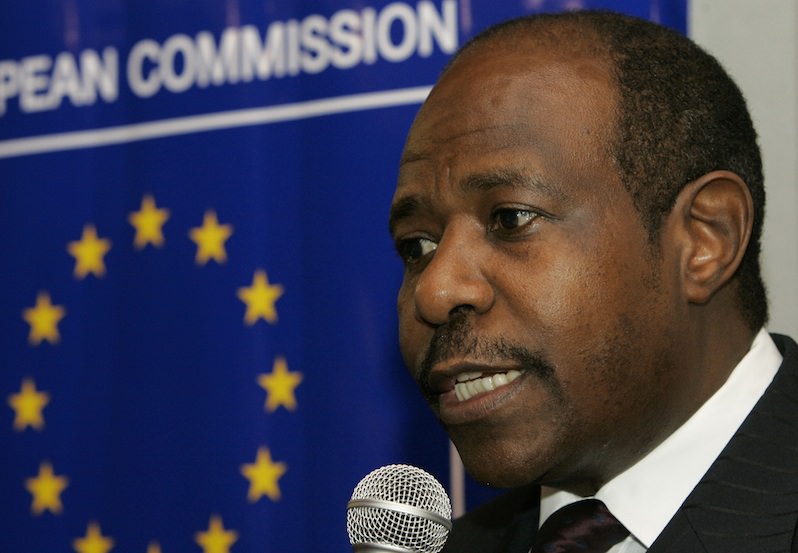 Paul Rusesabagina speaks at a news conference after a screening of the movie "Hotel Rwanda" at the Human Aid 4 Life film festival in Vienna in 2008. (AP/Lilli Strauss)
Paul Rusesabagina speaks at a news conference after a screening of the movie "Hotel Rwanda" at the Human Aid 4 Life film festival in Vienna in 2008. (AP/Lilli Strauss)
“You will find nobody living in Rwanda today who does not remember what they were doing in the early evening hours of April 6, 1994, when the private jet of President Juvenal Habyarimana was shot down with a portable missile as it approached for landing at Kigali Airport.”
— Paul Rusesabagina, “An Ordinary Man”
The 1994 Rwandan genocide was stunning for its ferocity and speed. Eight hundred thousand people were killed in the span of just 100 days. The slayings were organized and relentless. Racial distinctions that were barely tangible suddenly divided neighbors and even family members from one another, with government-backed paramilitary killers egged on by political and media elites to orchestrate large-scale slaughter.
Many Rwandans are of mixed heritage but traditionally have taken on their fathers’ identities. Those with Tutsi fathers, resented for their over-representation in colonial-era power structures, were massacred alongside moderate Hutus who dared to not join the carnage. One man named Paul Rusesabagina, a hotel manager born to a Hutu father and Tutsi mother, survived and helped keep more than 1,200 others alive in a miraculous effort that turned his hotel into a refuge. That story inspired the 2004 film “Hotel Rwanda,” starring Don Cheadle in an Oscar-nominated performance. Had his parents’ lineage been reversed, Rusesabagina would almost certainly have been killed.
But even as a Hutu he faced many instances during the genocide when he thought he was breathing his last breaths, as he recounted in his 2007 book, “An Ordinary Man.” In a tale that is equal parts horrifying and inspiring, Rusesabagina wove a story of extraordinary courage and resilience, maintaining humbly, “I am not a politician or a poet … I am nothing more or less than a hotel manager, trained to negotiate contracts and charged to give shelter to those who need it.”
Rusesabagina’s story is intensely gripping. I could not put the book down even though I desperately wanted to stop imagining women, children and men being hacked from limb to limb by machetes, and bodies piled up on street curbs. The book filled me with a combination of rage and grief and every other page provoked tears. But it also illustrated the incredible power wielded by a simple refusal to go along with the mob. Rusesabagina wrote, “[T]he only thing that saved those 1,268 people in my hotel was words. Not the liquor [which I used to ply officials], not money, not the UN. Just ordinary words directed against the darkness.”
In an interview with me on Uprising, Rusesabagina used his words eloquently to help make sense of the genocide. He told me, counter to the reductive explanation of ancient ethnic hatred fueling the killings, “Hutus and Tutsis do not hate each other as many people claim.”
He shared several reasons for why the genocide occurred. First, Rwandan politicians “used ethnicity in order to divide and rule.” Second, a sense of impunity spurred the killings because “people were not punished.” Third, “Rwanda has a problem of land. It is one of the most overpopulated countries in the world. Young people having no land, nothing to do, who are also hungry, is a problem.”
With conditions ripe for a conflict, all that remained was a media entity to goad the killers and a crisis to rally around. In the months and weeks before the genocide began, a private radio station called RTLM began relentlessly influencing national discourse on Hutu-Tutsi relations by dehumanizing Tutsis through constant references to them as “cockroaches” and warnings of an internal menace in the country. On April 6, 1994, the downing of Habyarimana’s plane provided the spark and RTLM fanned the flames to provoke a killing spree that lasted 100 days.
As is a constant theme in Rusesabagina’s book, words were of paramount importance in provoking the killings. He told me, “The media were urging people to go into neighbors’ rooms, look for ‘so-and-so’ and kill them.” The radio station dehumanized Tutsis, and according to Rusesabagina, “they were using words to smear their neighbors, calling them cockroaches so that it was not about killing human beings, but removing an infestation.”
The international shame around the Rwandan genocide was centered on Western inaction. Discouraged by the “Black Hawk Down” incident in Somalia, the U.S. was loath to intervene once more in another African country’s affairs. The United Nations, even though present in Rwanda, evacuated its own troops after a Belgian contingent was killed, leaving behind a skeleton crew with orders not to intervene. Again, the power of words played a role. The United States refused to use the term “genocide” to describe the killings even though Rwanda’s pogrom clearly fit the international definition. Labeling it a “genocide” would have precipitated action, and that was the problem. Rusesabagina put it bluntly: “The international community does not really care for Africa. [During the genocide] they decided to run away and abandon us.”
With no one to turn to for help, Rwandans like Rusesabagina relied on their wits to survive. That he kept 1,268 people alive for more than two months in a space meant for a few hundred, with no fresh water or food supply lines, and under the constant threat of attack, was nothing short of a miracle. He explained to me in his characteristic humor, “God intervened and made a miracle. But sometimes as we say in Kinyarwanda [the official language of Rwanda], God needs to be helped. So, through words, I was negotiating with each and everyone, and treating them as friends whether they were friends or not.” Weighed down by the responsibility of keeping so many people alive, Rusesabagina employed every clever trick of diplomacy he could muster, including “keeping your friends close and your enemies closer” and calling in every favor he could from elites who had frequented his hotels in the past. Eventually he negotiated passage for all 1,268 people out of the killing zone and to safety.
Today the terror of the genocide may be over, but how much progress has Rwanda really made in 20 years? President Obama, in a statement on the 20th anniversary of the genocide, lauded “the determination of the Rwandans who have made important progress toward healing old wounds, unleashing the economic growth that lifts people from poverty.” But he failed to mention ongoing human rights abuses. Rwanda’s current government, led by Paul Kagame, the leader of the Tutsi rebels during the genocide, is a strong U.S. ally. Rusesabagina wrote in an April 5 op-ed for The Boston Globe, “I cannot stand silent today when the current Rwandan government imprisons or assassinates its political opponents. I can’t stand silent when Rwanda sends proxy armies into the Democratic Republic of Congo to chase Hutu rebels who then come back with conflict minerals to line their own pockets.”
Rusesabagina denounced the current Rwandan government’s role in neighboring Congo, where more than 7 million people have died in an ongoing conflict of genocidal proportions. “Everyone knows that Rwanda is a U.S. ally,” he complained to me, arguing that it is simply a matter of the U.S. “telling them to stop” their destructive role.
Although many consider Rusesabagina a Rwandan hero, today he lives in exile from his home country — a strong indicator that Obama’s statement masks an ugly reality. He told me, “When the Tutsi rebels took over the country … the conquerors wanted each and everything. Being a general manager in a company was not allowed especially when you had not contributed to the war, when you were from one side and not the other one.” Two years after the end of the genocide, Rusesabagina was almost killed and managed, through his uncanny luck, to escape the country with his family.
Today he is jaded about the unmet commitments to peace in the aftermath of the genocide. “I had a belief that we were going to build a new Rwanda,” he mused. The pledge made by the rebel forces was that “Rwanda was to be a new paradise on earth — this is what they promised everybody.” He related post-genocide crimes by authorities such as beatings and burnings, the violent destruction of a refugee camp with machine guns and air fire from helicopters and the unjust imprisonment of hundreds of thousands of people. “I said to myself that enough was enough,” said Rusesabagina, who now lives in Brussels. He concluded that, “the very day you stand and speak out, when you say what people don’t want to be said, you always become their enemy.”
Rusesabagina continues to agitate for peace in Rwanda while in exile. Every time someone is killed by the Rwandan government or unjustly imprisoned, he speaks out through his Hotel Rwanda Rusesabagina Foundation. “The solution,” he believes, “is to silence guns and give a chance to words.”
Your support matters…Independent journalism is under threat and overshadowed by heavily funded mainstream media.
You can help level the playing field. Become a member.
Your tax-deductible contribution keeps us digging beneath the headlines to give you thought-provoking, investigative reporting and analysis that unearths what's really happening- without compromise.
Give today to support our courageous, independent journalists.

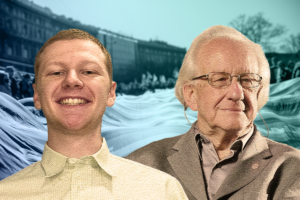
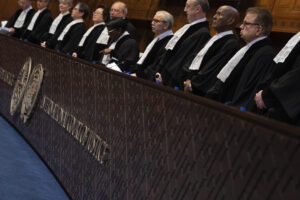
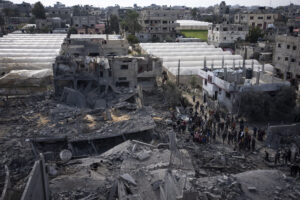
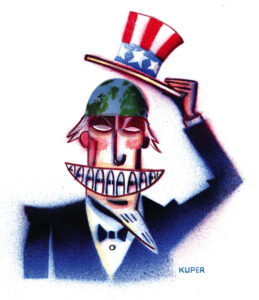
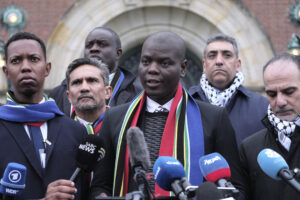
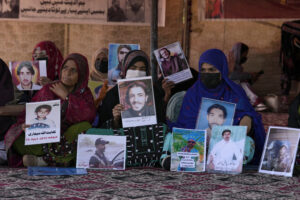


You need to be a supporter to comment.
There are currently no responses to this article.
Be the first to respond.